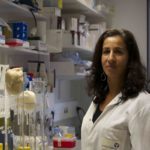Link to Pubmed [PMID] – 39386525
Link to HAL – pasteur-05116242
Link to DOI – 10.1101/2024.09.25.614947
bioRxiv 2024 Sep; ():
Defenses against oxidants are crucial for the virulence of pathogens, with superoxide scavenging enzymes (SOSEs) playing a vital role for most aerobes. However, our knowledge of superoxide adaptation primarily stems from the study of SOSE-encoding bacteria. Here, we investigated the evolution of a naturally SOSE-deficient pathogen ( Leptospira spp.), along with the alternative mechanisms it recruits to combat superoxide stress. We demonstrate that emergence of pathogenic Leptospira correlated with SOD loss, but that a long-lasting adaptation to superoxide remains possible. We reveal that cysteine and leucine biosynthesis are the most induced pathways in response to superoxide and demonstrate the importance of sulfur metabolism in superoxide adaptation in this SOSE-deficient model. We also propose cysteine oxidation as a key mediator of superoxide toxicity in the absence of SOSEs. This study challenges our conventional understanding of the oxygen toxicity theory and proposes a new model of superoxide adaptation through metabolic rewiring in bacteria.





